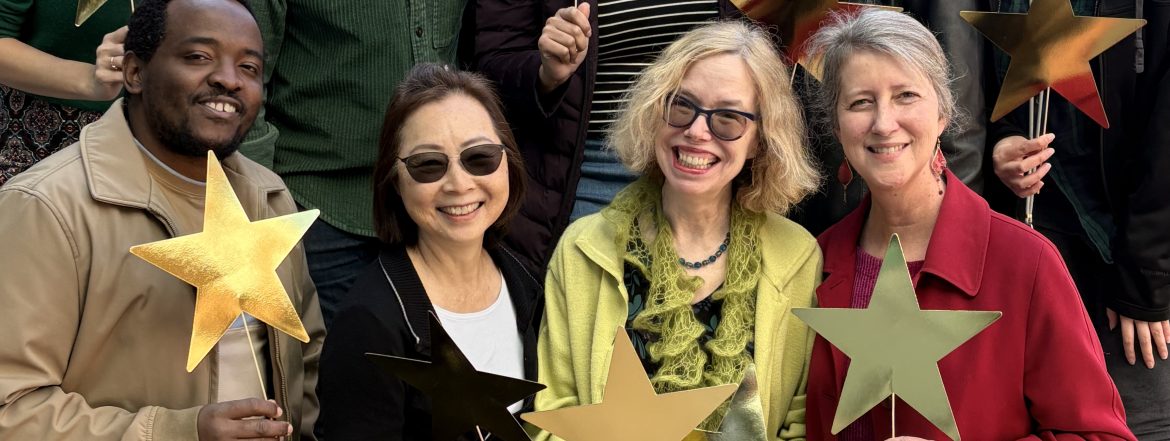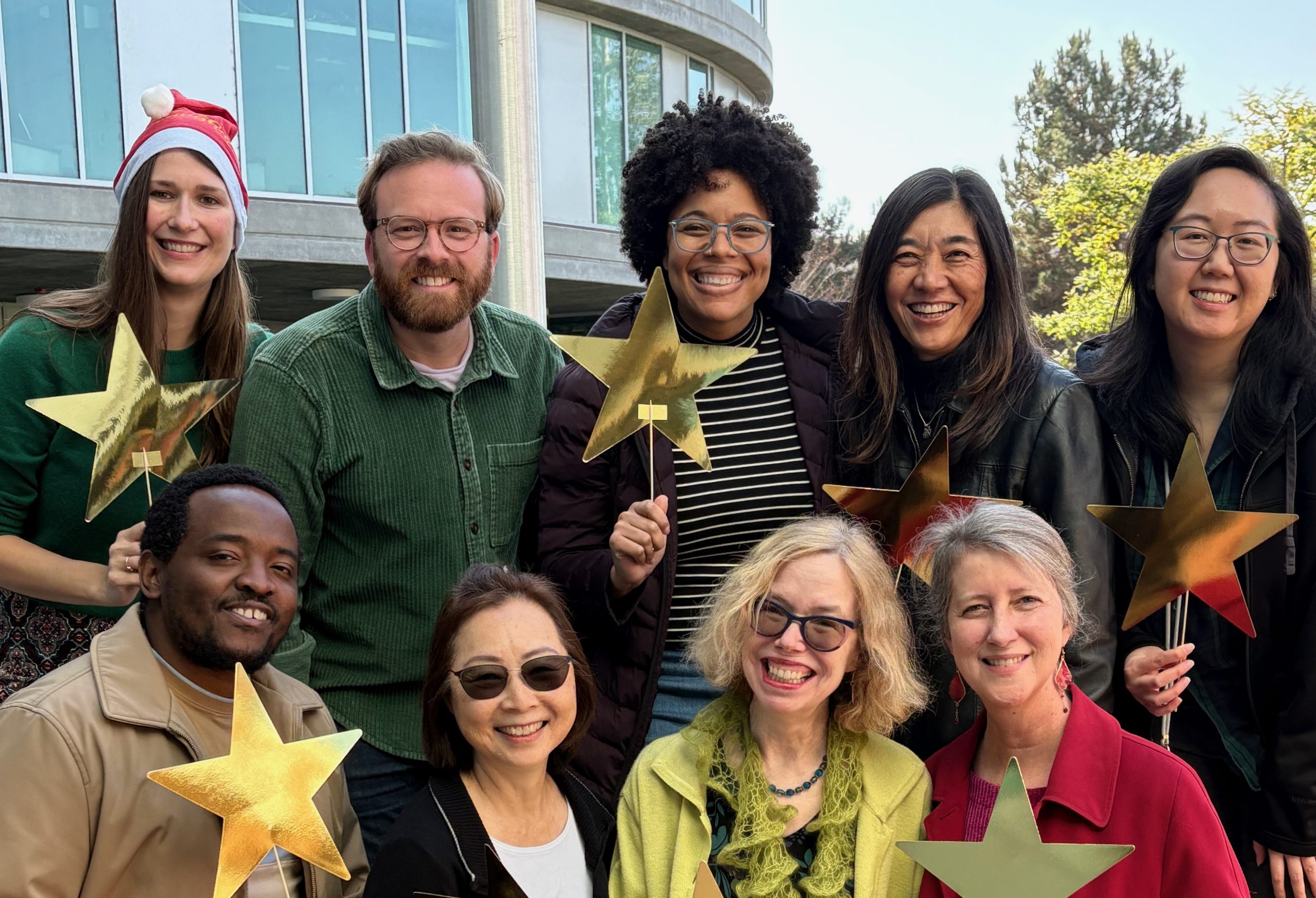Interim Director Julia Lupton on Relationships, Sustenance, and the Art of Listening
Julia Reinhard Lupton served as Interim Director of UCHRI from 2022 until 2025. As a Distinguished Professor of English at UC Irvine, she also served as Associate Dean for Research, directed the Humanities Commons, and created the Illuminations program. She continues to co-direct the New Swan Shakespeare Center, which she co-founded with Eli Simon. The author of five books on Shakespeare, Lupton is a former ACLS and Guggenheim Fellow and a frequent teacher in the community. Dr. Sara Černe, Research Grants Program Director at the Institute, asked Julia a few questions about her time at UCHRI.
SC: UCHRI has undergone many changes in the past three years, from the transition to an endowment funding model to increased collaboration with the ten campuses of the University of California. What accomplishments are you most proud of?
JRL: Stabilizing UCHRI’s funding was certainly the most urgent goal for my appointment. Working with the Mellon Foundation on permanent funding for UCHRI began under the leadership of Director Emeritus David Theo Goldberg, and I am grateful to the many people who helped us secure the endowment, especially UC Provost Katherine Newman and Professor Ralph Hexter (UC Davis).
My heart will always lie with programming, though. One of my first tasks as a new director was to attend the fall gathering of our Underrepresented Scholars intercampus mentorship program. I loved what I saw, and you and I decided to apply for an Advancing Faculty Diversity grant from UCOP. With AFD support, we’ve expanded this opportunity from six mentor-mentee pairs to fifteen, and we are now reaching nine of the ten UC campuses. Mentoring is an art of listening, and I have been honored to listen in on so many conversations among faculty members from across the UC.
SC: Of the many events and initiatives UCHRI hosted in recent years, which ones would you characterize as having the most lasting impact?
JRL: Our 2025 conference Mapping New California Histories celebrated some of the extraordinary work being done by UCHRI-affiliated historians, cartographers, and archivists across the University of California. We also partnered with the History Project and the Teachers Academy at UC Irvine, and we showcased an impactful book published by UC Press, A People’s Guide to Orange County. This program represents so much of UCHRI’s mission, from spotlighting California to fostering intercampus conversations to partnering with UC Press. The conference also took me back to my early years as a public humanist when I founded Humanities Out There, an educational partnership with the Santa Ana Unified School District. Many of the grad students I worked with in the early 2000s have now become leaders in public history, and I got to reconnect with a lot of old friends.
I am also really proud of our climate communications work. As a contributor to WUICAN: Wildland-Urban Interface Climate Action Network, we ran a successful undergraduate internship program and a summer institute for humanities grad students. Each program placed humanities students in meaningful community settings to conduct collaborative research and write climate stories. Everyone benefited from the interactions, and our collective vision of what the humanities can be and do grew along the way.
As part of WUICAN, UCHRI also worked with faith leaders from six different religious communities to host a series of events organized around the four elements. Each gathering began with an immersive experience—we lit candles in honor of Fire and planted a fig tree in honor of Earth—followed by presentations featuring the climate justice work of scientists and community organizers.
Ahimsa is the Hindu and Jain idea of doing no harm. Stewardship in Christianity, Judaism (tikkun olam), and Islam (khalifa) enjoin human beings to care for creation. Indigenous animisms approach all creatures as ensouled beings worthy of communion and respect. These are some of the lessons I learned from our faith partners, whose wisdom traditions can offer renewable resources for education, conservation, and resilience in times of distress—and new templates and settings for public humanities.
SC: What do you see as the magic of an intercampus institute like ours?
JRL: The magic lies in the connections—among people, campuses, and ideas. Humanists and physicians co-designing anti-racist med school modules or developing bilingual tools for health care settings. Graduate students creating new syllabi in Critical Fashion Studies. Native artists and scholars holding their own Indigi–Con. These are just some of the UCHRI-funded projects that have really inspired me over the past three years.
My own world has grown so much. Beginning with our 2022 conference Refuge at Risk, I worked with Jane O. Newman (UC Irvine) and other UC colleagues to bring together scholars displaced by war and turmoil with their UC faculty hosts and allies to share stories and resources. Learning about their journeys was truly humbling, and I was glad to be a small part of these conversations.
What I’ll remember most about my time at the Institute are the people behind the projects, from our dedicated staff and my colleagues in the Humanities Network to the faculty and graduate students I’ve met at the different UCs. Relationship-building takes patience, care, and trust. I am always amazed by how much effort goes into hosting a gathering, awarding a grant, or publicizing the findings of a research project. When we do it well, though, the rewards are immense, for those we serve and for our evolving sense of the humanities.
Refuge, care and repair, entanglement, and now sustenance: these UCHRI themes get at the heart of the values and vision of the humanities today. They are topics for research and reflection; they are also words to live by.
SC: What do you look forward to the most in your retirement?
JRL: I want to finish my book on Shakespeare and virtue. For Shakespeare, virtues such as courage and hope linked reason to passion, characters to context, and art to life. There’s an untold story there that I’m eager to share.
As you know, I like to bake in my downtime. Baking hits the sweet spot between self-care and care for others, so expect me to be dropping off some special deliveries. And of course I’ll be following UCHRI on Instagram—I’m excited to see where incoming Director Jaimey Fisher and the UCHRI team take the Institute in the next few years.


